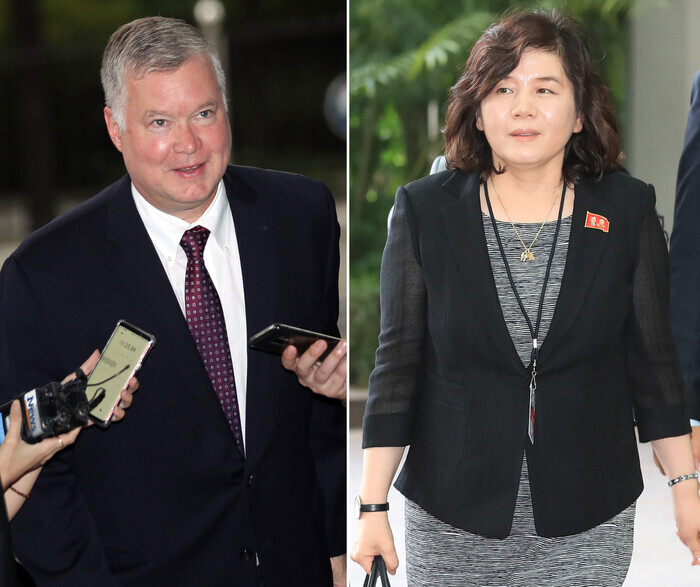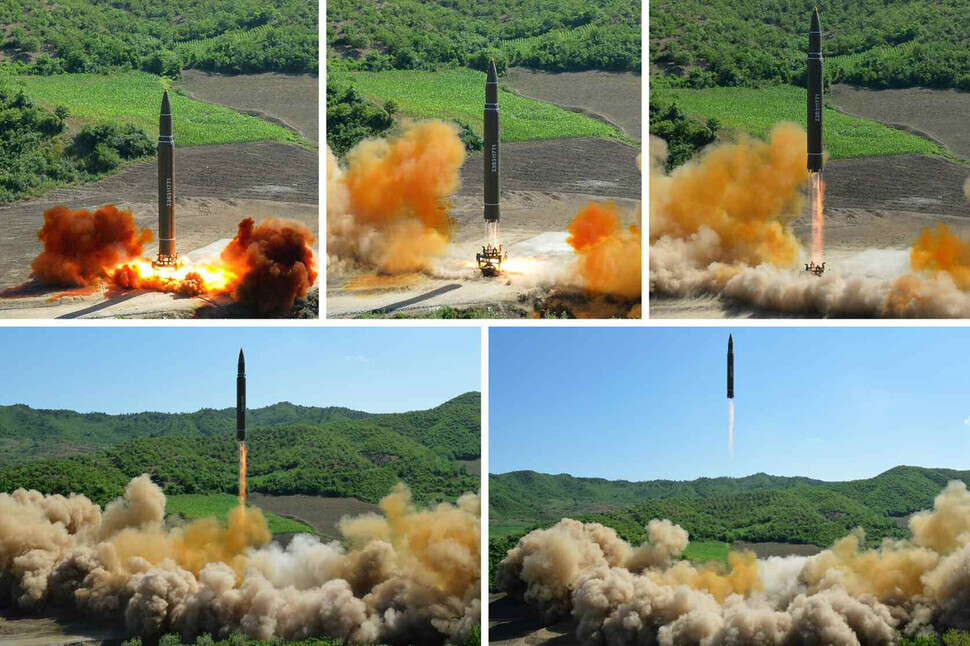hankyoreh
Links to other country sites 다른 나라 사이트 링크
[News analysis] Will Biegun send a message to N. Korea during his visit to Seoul?

On July 7, US Deputy Secretary of State and Special Representative for North Korea Stephen Biegun will be kicking off a visit to South Korea, where he’s likely to meet a range of key officials in the South Korean government’s foreign policy and national security team. As attention turns to what message Biegun might send the North, the Korean Central News Agency (KCNA) printed a statement by North Korean First Vice Minister of Foreign Affairs Choe Son-hui on July 4 in which she said that the North does “not feel any need to sit face to face with the US.”
On that same day, [North Korean state-run media] gave major coverage to the North’s successful launch three years ago of an intercontinental ballistic missile (ICBM) capable of hitting the US, while consciously refraining from criticizing the US. That reinforces the interpretation that the key point of Choe’s statement is not rejecting dialogue but pushing the US to take meaningful action.
Multiple government officials told the Hankyoreh on July 5 that Biegun is planning to meet high-ranking officials in the Ministry of Foreign Affairs — including Foreign Minister Kang Kyung-wha, First Vice Foreign Minister Cho Sei-young, and Lee Do-hoon, special representative for Korean Peninsula peace and security affairs — during his three-day trip to South Korea. Given the freeze in inter-Korean relations and the lack of noticeable progress in North Korea-US dialogue, it’s not out of the question that South Korean President Moon Jae-in could meet with Biegun to explain his North Korean policy for the second half of his presidency and to call for the swift resumption of North Korea-US dialogue.
Biegun is likely to present his message to North Korea during a brief press conference that’s scheduled during his visit to Seoul. North Korea’s response will likely depend on whether Biegun brings a forward-looking message capable of getting the ball rolling on North Korea-US dialogue.
On July 4 — the very day that the KCNA ran Choe’s statement about North Korea not needing to sit down with the US — the Rodong Sinmun printed 12 feature stories in its first three pages about the successful launch of the Hwasong-14 ICBM in 2017. Notably, these articles did not take a critical or hostile tone toward the US. Hwasong-14 is the first North Korean missile that is within range of the continental US. This restraint hints at a message to the US that the North has not stated explicitly.
The first sentence of Choe’s statement is as follows: “The words ‘DPRK [North Korea]-US summit’ which have become dim even in our memory [have] become a topic for conversation [since] some days ago, drawing the attention of the international community.”
“Is it possible to hold dialogue or have any dealings with the US which persists in the hostile policy toward the DPRK in disregard of the agreements already made at the past summit?” Choe wrote in the statement. “We do not feel any need to sit face to face with the US, as it does not consider the DPRK-US dialogue as [anything] more than a tool for grappling [with] its political crisis.”

Choe’s statement shouldn’t be taken as a complete and unconditional dismissal of dialogue with the US. It’s closer to an objection to the US’ “hostile policy” and a rejection of talks that would be used as a “tool” for aiding the reelection of US President Donald Trump. Her statement makes clear to Biegun — who said in a lecture on June 30 that “we believe there’s still time for the United States and North Korea to make substantial progress in the direction that we believe that both sides want to go” — that North Korea won’t take part in dialogue for dialogue’s sake. In effect, the North wants action, not words.
The articles in the Rodong Sinmun said that “this is a critical moment for continuing the great project of achieving wealth and prosperity through our own resources” and called for “industry focused on creative development,” “a society-wide ethos of focusing on the numbers [such as profit],” and “socialist competition at the level of the region, the sector, and the unit.” The cover story of the newspaper’s July 5 edition was an editorial urging the government to bolster its emergency fight against COVID-19 and to build the Pyongyang General Hospital. These are points that reveal the key interests of North Korean leader Kim Jong-un and hint at a potential driver for renewing work on the Korean Peninsula Peace Process.
By Lee Je-hun, senior staff writer, and Noh Ji-won, staff reporter
Please direct comments or questions to [english@hani.co.kr]

Editorial・opinion
![[Column] Has Korea, too, crossed the Rubicon on China? [Column] Has Korea, too, crossed the Rubicon on China?](https://flexible.img.hani.co.kr/flexible/normal/500/300/imgdb/original/2024/0419/9317135153409185.jpg) [Column] Has Korea, too, crossed the Rubicon on China?
[Column] Has Korea, too, crossed the Rubicon on China?![[Correspondent’s column] In Japan’s alliance with US, echoes of its past alliances with UK [Correspondent’s column] In Japan’s alliance with US, echoes of its past alliances with UK](https://flexible.img.hani.co.kr/flexible/normal/500/300/imgdb/original/2024/0419/2317135166563519.jpg) [Correspondent’s column] In Japan’s alliance with US, echoes of its past alliances with UK
[Correspondent’s column] In Japan’s alliance with US, echoes of its past alliances with UK- [Editorial] Does Yoon think the Korean public is wrong?
- [Editorial] As it bolsters its alliance with US, Japan must be accountable for past
- [Guest essay] Amending the Constitution is Yoon’s key to leaving office in public’s good graces
- [Editorial] 10 years on, lessons of Sewol tragedy must never be forgotten
- [Column] A death blow to Korea’s prosecutor politics
- [Correspondent’s column] The US and the end of Japanese pacifism
- [Guest essay] How Korea turned its trainee doctors into monsters
- [Guest essay] As someone who helped forge Seoul-Moscow ties, their status today troubles me
Most viewed articles
- 1[Column] The clock is ticking for Korea’s first lady
- 2[Correspondent’s column] In Japan’s alliance with US, echoes of its past alliances with UK
- 3After 2 months of delayed, denied medical care, Koreans worry worst may be yet to come
- 4[Column] Has Korea, too, crossed the Rubicon on China?
- 5[Editorial] When the choice is kids or career, Korea will never overcome birth rate woes
- 6Samsung barricades office as unionized workers strike for better conditions
- 7US exploring options for monitoring N. Korean sanctions beyond UN, says envoy
- 8US overtakes China as Korea’s top export market, prompting trade sanction jitters
- 9[Photo] Smile ambassador, you’re on camera
- 10Hong Se-hwa, voice for tolerance whose memoir of exile touched a chord, dies at 76